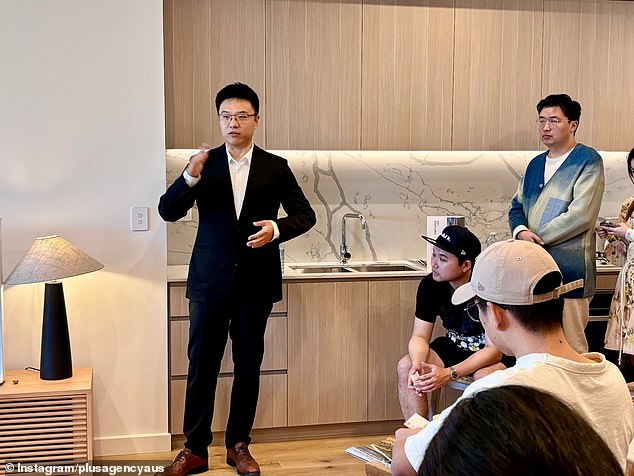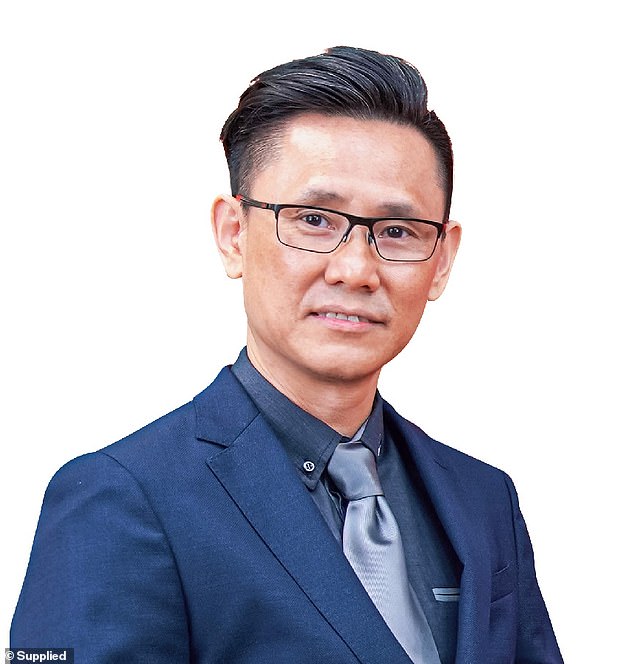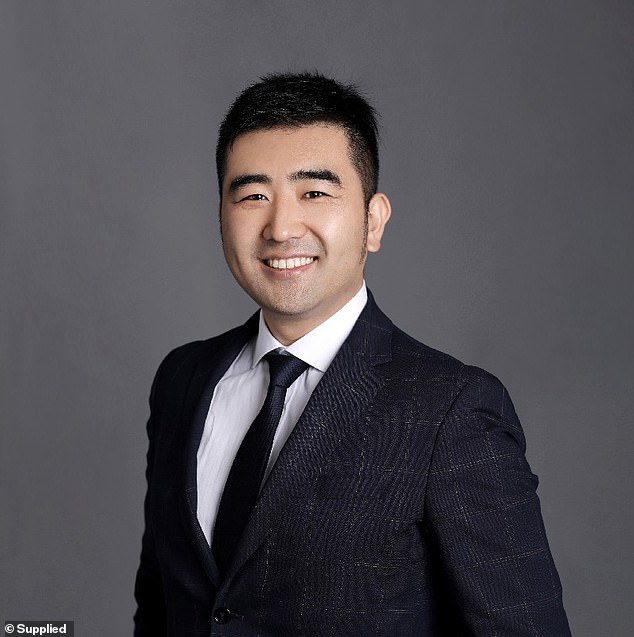Chinese investors find easy way around Labor’s tax hike on foreigners snapping up Australian real estate
Chinese investors continue to acquire Australian property using a simple loophole to avoid Labor’s higher taxes on foreign buyers.
A property group that markets Australian properties to wealthy Asian investors said Chinese investors are now simply waiting to gain permanent resident status before buying an Australian property and thus avoid higher taxes.
“Rather than buying as a non-resident, most wait until they have permanent residency in Australia,” Daniel Ho, co-founder and director of Juwai IQI, told Daily Mail Australia.
“If you know you’re on your way to permanent residency, there’s no reason to pay the additional costs associated with purchasing as a non-resident.”
Chinese investors are now smartly buying property after becoming permanent residents to avoid new rules for foreigners (pictured are potential buyers in Sydney)
Peter Li, the Sydney-based manager of the Plus Agency, agreed, telling Daily Mail Australia that Chinese buyers would continue to snap up local homes, driving up already high prices even further.
“The trend among buyers… in 2024 will be similar to 2023: fewer offshore buyers and more onshore buyers,” he said.
‘They buy for their own use or for their studying children to live in.’
Foreigners may only purchase an existing property in Australia (i.e. not new construction) if they are residents and can prove that they live, work or study locally.
But foreigners who don’t live in Australia are only allowed to buy something that’s brand new, in a bid to encourage the construction of residential apartments to increase the supply of housing.
However, permanent residents are treated differently from foreigners and do not require FIRB approval to purchase a new or established property or plot of land.
They have much more financial freedom than temporary residents such as international students, who are allowed to buy an established property but must sell six months after graduation if they are not granted permanent residency.
Treasurer Jim Chalmers and Housing Minister Julie Collins announced last week that the fee for foreigners buying established homes would triple, and the vacancy fee for foreigners leaving homes empty would double.
The new law on the imposition of foreign takeovers and takeover fees 2024 Applies to those who have purchased since May 9, 2017.
That means someone who buys an existing home worth less than $1 million will pay $42,300 instead of $14,100 to the Foreign Investment Review Board.
Someone who buys a home that is vacant and not rented will see their annual vacancy fee double from $42,300 to $84,600.
Fees for both categories increase based on the value of the property, with thresholds up to $40 million.
But with foreign migration at record levels and permanent residency status so liberal, Labor’s new policy serves as a tax grab rather than a meaningful attempt to cool Chinese demand and help locals compete.

A property group that markets Australian real estate to wealthy Asian investors made the disclosure after Labor announced a crackdown on foreign investors buying property without living locally (pictured is a Plus Agency agent working in Sydney)
Mr Ho said his clients were reluctant to pay higher fees to FIRB, but the loophole was an easy way around this.
“Owning a property as a foreign buyer, with land tax and vacancy tax, is more expensive than owning it after getting permanent residency,” he said.
“So a host of factors are preventing Chinese non-resident buyers from purchasing once they get their place of residence in order.”
A Treasury report on foreign investment for the September quarter showed that China was still the largest source of approved residential real estate, with $700 million worth of investments, followed by Hong Kong with $100 million.
Vietnam, India and Taiwan were also the source of $100 million in investment each.
‘China is still the largest investor, but what we are seeing among our customers is fewer foreign Chinese and Hong Kong buyers are buying,” Mr Ho said.
The Plus Agency sold ten properties sold over Christmas and New Year, ending a year with annual sales of more than $200 million.
“All 10 holiday shoppers we closed with over the Christmas holidays are from Hong Kong and mainland China,” Mr Li said.
“We see many Hong Kongers coming back to Sydney during the Australian holidays to see their children who live and work in Australia.”
Sydney, the biggest recipient of overseas migration, became even more expensive in 2023, even as the Reserve Bank raised interest rates for the thirteenth time in eighteen months in November to a twelve-year high of 4.35 percent.
Despite higher monthly mortgage repayments, the average house price in Sydney rose 12.8 per cent to $1.395 million in the year to January, CoreLogic data showed.
Net foreign immigration is also expected to decline in 2024, after hitting a record high of 518,000 in the 2022-2023 financial year.
But Li still expects property prices to continue to grow strongly this year.

Juwai IQI co-founder and managing director Daniel Ho said Chinese investors are now waiting to become a permanent resident before buying an Australian property to avoid new expensive taxes
‘Do not expect a price correction in 2024. “It is more likely that prices will remain at their high levels or even increase slightly,” Ho said.
“Buyers are willing to continue paying high prices because the shortage of homes and rental properties leaves no other choice.”
Prime Minister Anthony Albanese’s government has also abolished its ‘golden visa’, which gave wealthy foreign investors the right to live in the country.
The key investor visa was revoked on January 22 during an immigration overhaul after the government found it was “delivering poor economic outcomes”.
Home Secretary Clare O’Neil said the troubled program – introduced by former Labor Prime Minister Julia Gillard in 2012 – was part of the “broken” system Labor inherited.

Peter Li, the Sydney-based manager of the Plus Agency, told Daily Mail Australia that Chinese buyers are now more likely to buy something they or their children can live in.
Chris Bowen was immigration minister at the time, but is now in charge of the climate and energy portfolios.
The visa required a minimum investment of $5 million in Australia, in return for automatic permanent residency.
Since its inception in 2012, the program has granted thousands of major investor visas, with 85 percent of successful applicants coming from China.
